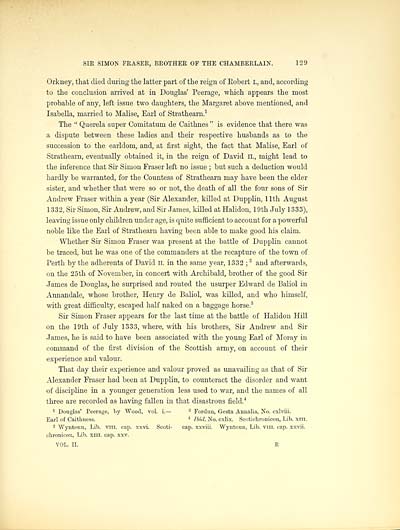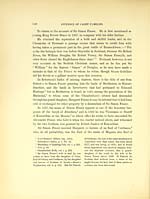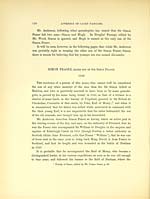Frasers of Philorth > Volume 2
(143)
Download files
Complete book:
Individual page:
Thumbnail gallery: Grid view | List view

SIR SIMON FRASER, BROTHER OF THE CHAMBERLAIN. 129
Orkney, that died during the latter part of the reign of Eobert I., and, according
to the conclusion arrived at in Douglas' Peerage, which appears the most
probable of any, left issue two daughters, the Margaret above mentioned, and
Isabella, married to Malise, Earl of Strathearn. 1
The " Querela super Comitatum de Caithnes " is evidence that there was
a dispute between these ladies and their respective husbands as to the
succession to the earldom, and, at first sight, the fact that Malise, Earl of
Strathearn, eventually obtained it, in the reign of David II., might lead to
the inference that Sir Simon Fraser left no issue ; but such a deduction would
hardly be warranted, for the Countess of Strathearn may have been the elder
sister, and whether that were so or not, the death of all the four sons of Sir
Andrew Fraser within a year (Sir Alexander, killed at Dupplin, 11th August
1332, Sir Simon, Sir Andrew, and Sir James, killed at Halidon, 19th July 1333),
leaving issue only children under age, is quite sufficient to account for a powerful
noble like the Earl of Strathearn having been able to make good his claim.
"Whether Sir Simon Fraser was present at the battle of Dupplin cannot
be traced, but he was one of the commanders at the recapture of the town of
Perth by the adherents of David n. in the same year, 1332 ; 2 and afterwards,
on the 25 th of November, in concert with Archibald, brother of the good Sir
James de Douglas, he surprised and routed the usurper Edward de Baliol in
Annandale, whose brother, Henry de Baliol, was killed, and who himself,
with great difficulty, escaped half naked on a baggage horse. 3
Sir Simon Fraser appears for the last time at the battle of Halidon Hill
on the 19th of July 1333, where, with his brothers, Sir Andrew and Sir
James, he is said to have been associated with the young Earl of Moray in
command of the first division of the Scottish army, on account of their
experience and valour.
That day their experience and valour proved as unavailing as that of Sir
Alexander Fraser had been at Dupplin, to counteract the disorder and want
of discipline in a younger generation less used to war, and the names of all
three are recorded as having fallen in that disastrous field. 4
1 Douglas' Peerage, by Wood, vol. i. — 3 Fordvm, Gesta Annalia, No. cxlviii.
Earl of Caithness. 4 Ibid. No. cxlix. Scotiehronicon, Lib. xin.
2 Wyiitoun, Lib. VIII. cap. xxvi. Scoti- cap. xxviii. Wyntoun, Lib. vni. cap. xxvii.
chronicon, Lib. XIII. cap. xxv.
VOL. II. E
Orkney, that died during the latter part of the reign of Eobert I., and, according
to the conclusion arrived at in Douglas' Peerage, which appears the most
probable of any, left issue two daughters, the Margaret above mentioned, and
Isabella, married to Malise, Earl of Strathearn. 1
The " Querela super Comitatum de Caithnes " is evidence that there was
a dispute between these ladies and their respective husbands as to the
succession to the earldom, and, at first sight, the fact that Malise, Earl of
Strathearn, eventually obtained it, in the reign of David II., might lead to
the inference that Sir Simon Fraser left no issue ; but such a deduction would
hardly be warranted, for the Countess of Strathearn may have been the elder
sister, and whether that were so or not, the death of all the four sons of Sir
Andrew Fraser within a year (Sir Alexander, killed at Dupplin, 11th August
1332, Sir Simon, Sir Andrew, and Sir James, killed at Halidon, 19th July 1333),
leaving issue only children under age, is quite sufficient to account for a powerful
noble like the Earl of Strathearn having been able to make good his claim.
"Whether Sir Simon Fraser was present at the battle of Dupplin cannot
be traced, but he was one of the commanders at the recapture of the town of
Perth by the adherents of David n. in the same year, 1332 ; 2 and afterwards,
on the 25 th of November, in concert with Archibald, brother of the good Sir
James de Douglas, he surprised and routed the usurper Edward de Baliol in
Annandale, whose brother, Henry de Baliol, was killed, and who himself,
with great difficulty, escaped half naked on a baggage horse. 3
Sir Simon Fraser appears for the last time at the battle of Halidon Hill
on the 19th of July 1333, where, with his brothers, Sir Andrew and Sir
James, he is said to have been associated with the young Earl of Moray in
command of the first division of the Scottish army, on account of their
experience and valour.
That day their experience and valour proved as unavailing as that of Sir
Alexander Fraser had been at Dupplin, to counteract the disorder and want
of discipline in a younger generation less used to war, and the names of all
three are recorded as having fallen in that disastrous field. 4
1 Douglas' Peerage, by Wood, vol. i. — 3 Fordvm, Gesta Annalia, No. cxlviii.
Earl of Caithness. 4 Ibid. No. cxlix. Scotiehronicon, Lib. xin.
2 Wyiitoun, Lib. VIII. cap. xxvi. Scoti- cap. xxviii. Wyntoun, Lib. vni. cap. xxvii.
chronicon, Lib. XIII. cap. xxv.
VOL. II. E
Set display mode to:
![]() Universal Viewer |
Universal Viewer | ![]() Mirador |
Large image | Transcription
Mirador |
Large image | Transcription
Images and transcriptions on this page, including medium image downloads, may be used under the Creative Commons Attribution 4.0 International Licence unless otherwise stated. ![]()
| Histories of Scottish families > Frasers of Philorth > Volume 2 > (143) |
|---|
| Permanent URL | https://digital.nls.uk/96571972 |
|---|
| Attribution and copyright: |
|
|---|---|
| Description | A selection of almost 400 printed items relating to the history of Scottish families, mostly dating from the 19th and early 20th centuries. Includes memoirs, genealogies and clan histories, with a few produced by emigrant families. The earliest family history goes back to AD 916. |
|---|

